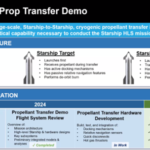June 1, 2016 – According to a new paper appearing in the journal Science on May 27, 2016, when Mars has undergone Ice Ages in the past, instead of the ice building up in the polar ice caps, they have actually thinned.
A detailed analysis by the Mars Reconnaissance Orbiter using its subsurface radar, SHARAD, has concluded that Martian poles get warmer during ice ages causing the ice to retreat. The water vapour released into the atmosphere migrates toward the equator leading to large accumulations of glaciers and ground ice at mid-latitudes.
On Earth our Ice Ages have produced significant accumulations in the polar regions with extensive growth of ice fields and glaciers. But the ice doesn’t migrate to the equatorial region of the planet.
Today Mars is experiencing a warming period and that is causing polar ice fields to grow. SHARAD data shows the poles have seen ice accumulations grow by a depth of 300 meters (980 feet) since the last ice age some 370,000 years ago.
What triggers ice ages on Mars? Scientists suspect it is the planet’s axial tilt. There are times as Mars more exaggerated orbit (it is more of an oval than Earth’s as seen in image below) combines with axial tilt to create optimal conditions for the warming of polar regions which then lose ice volume to temperate and equatorial areas on the planet. When the warm polar periods end as Mars axial tilt and distance from the Sun reverse conditions, the migration of ice goes pole-ward.
If the ice accumulated in the polar caps were to be uniformly spread across the planet, Mars would have a global layer 60 centimeters (about 2-feet) thick. That’s how much surface water still remains on the planet.

















